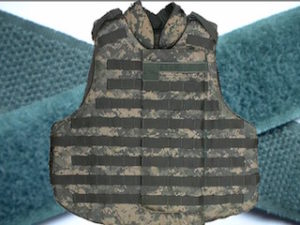
“Hey, the Commander wants to see you.”
“@#%$, what now?”
“I don’t know, but he looked pissed.”
Sound familiar? Replace “Commander” with any authority figure at any level, whether it be “Gunny” or “Smoke” or “Chief”, and you’ll get the same effect. In our time in the military, we learn to react a certain way when things like this happen, and in my experience it has never been positive. Has this caused you to develop emotional Kevlar, or emotional Velcro?
Think about the Kevlar lining in your body armor, flak jacket, whatever. It’s not completely bulletproof, but it is significantly resilient enough to stop small shrapnel and sharp objects. Compare that to the Velcro on that body armor…it’s a magnet for all kinds of the crap that floats around in the air. Which of the two did you have to spend more time cleaning when it came time to turn in your gear?
We can get the same way emotionally and psychologically. Sometimes, the stuff we hear bounces off our mind like a pebble bouncing off our body armor, and other times, the stuff we hear attaches to our minds like military-grade adhesive. The problem is, we often let the bad stuff stick, and allow the good stuff to bounce off.
Like many veterans, I’m not very good at compliments or appreciation. When someone says I did a good job at something, I shift the compliment to someone else or dismiss it with, “I was only doing my job, I’m not special at all.” Criticism, though, I can certainly take that one to the bank. Which was more impactful to you, a positive performance review or a negative one? If that was the case when you were in the military, have you carried it into life as well?
I have yet to find the man, however exalted his station, who did not do better work and put forth greater effort under a spirit of approval than under a spirit of criticism.
Charles Schwab
The specificity of the compliment or criticism is important. When we receive compliments, we need to know exactly what it was about the action being complimented that was “good”…saying “you did a good job, there” is not enough to make it stick to our emotional Velcro. We need to know why you thought it was a good job, what about the job was good, how good it was compared to other jobs that were done, and most of the time, we will STILL deny that it was a good job because we don’t want to be seen as an arrogant jerk! How about the details of the criticism, though? We certainly don’t need those! When someone tells us, “you sure screwed that one up”, we take that particular ball and run with it without checking to see if it’s even our ball to take! Without taking as hard a look at criticism as we do with compliments, we would not be able to dispute it. It’s a forgone conclusion…yep, I screwed up, won’t happen again. Meanwhile, we walk away kicking ourselves in the fourth point of contact, likely for something that wasn’t entirely our fault to begin with.
Don’t get me wrong. I’m huge on personal responsibility and being accountable for my own actions, and recommend a healthy dose of personal accountability for everyone. The problem is, a lot of the veterans I meet are carrying a load of personal accountability that is greater than they should. We all have moments in our past where we think, “that’s my fault.” It’s the nature of the work that we did; serious, critical, life-changing stuff. The word “fault”, though, implies guilt, which is one of those words that attaches to our emotional Velcro, and won’t come off unless we do a whole bunch of scrubbing.
The source of the compliment and criticism is also important. Some random yahoo who we don’t even know, when THEY say, “you sure jacked that one up, pal,” we don’t even give it the time of day. Bounces off the emotional Kevlar like a rock from a slingshot. The problem is, a compliment from the same random yahoo also bounces off without impact. Criticism from a trusted source…a valued mentor, one of our subordinates, a spouse or a parent? Buckle up, because we’re taking that one all the way down the road. We will attach it to our emotional Velcro and leave it on so long that it’s like it was applied with 100MPH tape. Compliments received from a thousand random yahoos will not counteract one criticism from someone close to us. Many times, we will weed through those hundred compliments just to find the one criticism, then say, “Hah! See? I was right! I DID jack it up.” Then we walk down the road kicking ourselves in the fourth point of contact. See a pattern?
“You have been criticizing yourself for years and it hasn’t worked. Try approving of yourself and see what happens.”
― Louise L. Hay
What about the compliments and criticism that we give to ourselves? Forget the fact that we are our own worst critics and are unlikely to compliment ourselves in the general sense anyway. The criticism that we tell ourselves sticks to our emotional Velcro quicker, stronger, and longer than any amount of criticism that others can give. We continue to punch ourselves in the face long after the fight is over…why is that? Do we enjoy feeling like crap, struggling with guilt, shame, transforming it into anger and bitterness like some dysfunctional alchemist? I don’t know about you, but I sure don’t like feeling like that, and most veterans I work with don’t enjoy it either. So why do we do it to ourselves?
The key is awareness; being aware of how you react to criticism, and how you react to compliments. You don’t have to stand on top of the mountain and shout to the world that you’re the greatest…ain’t none of us Mohammad Ali. At the same time, though, you don’t have to deflect compliments as if they were criticism, and accept criticism as though they were compliments. Give each of them equal value, considering the source, and allow yourself the opportunity to appreciate each of them. Swap them around…for compliments, use less Kevlar and more Velcro, and for criticism, use less Velcro and more Kevlar. You might find that the balance you obtain will lead to a more pleasant and fulfilling life.



